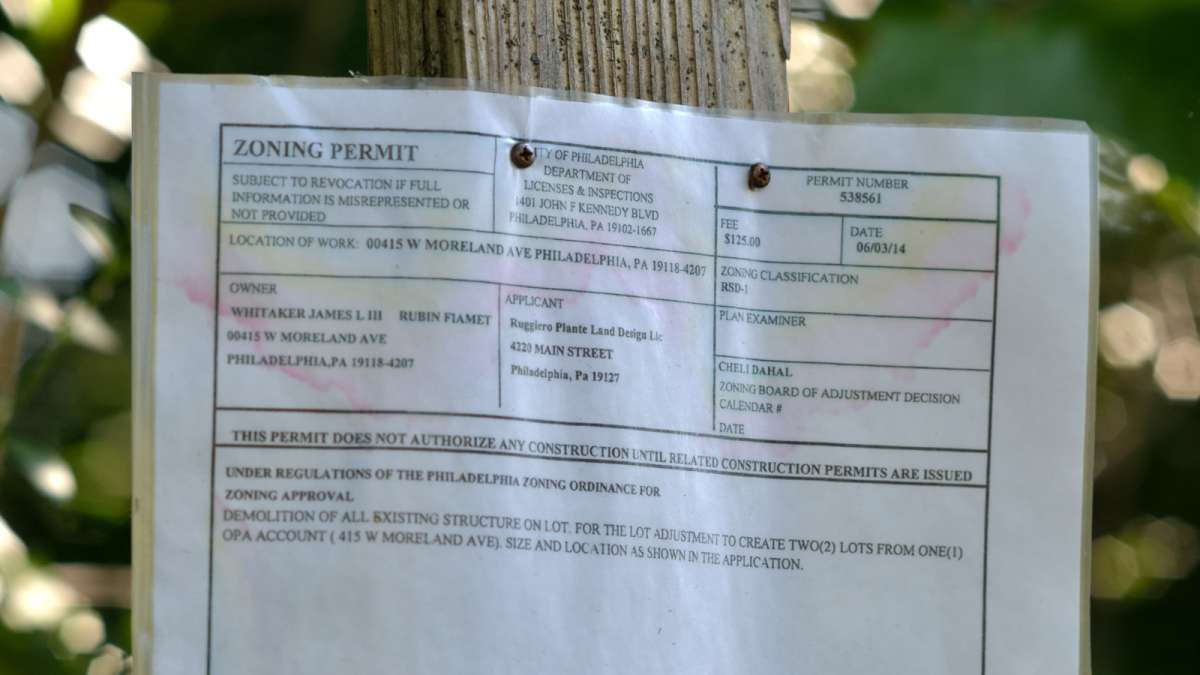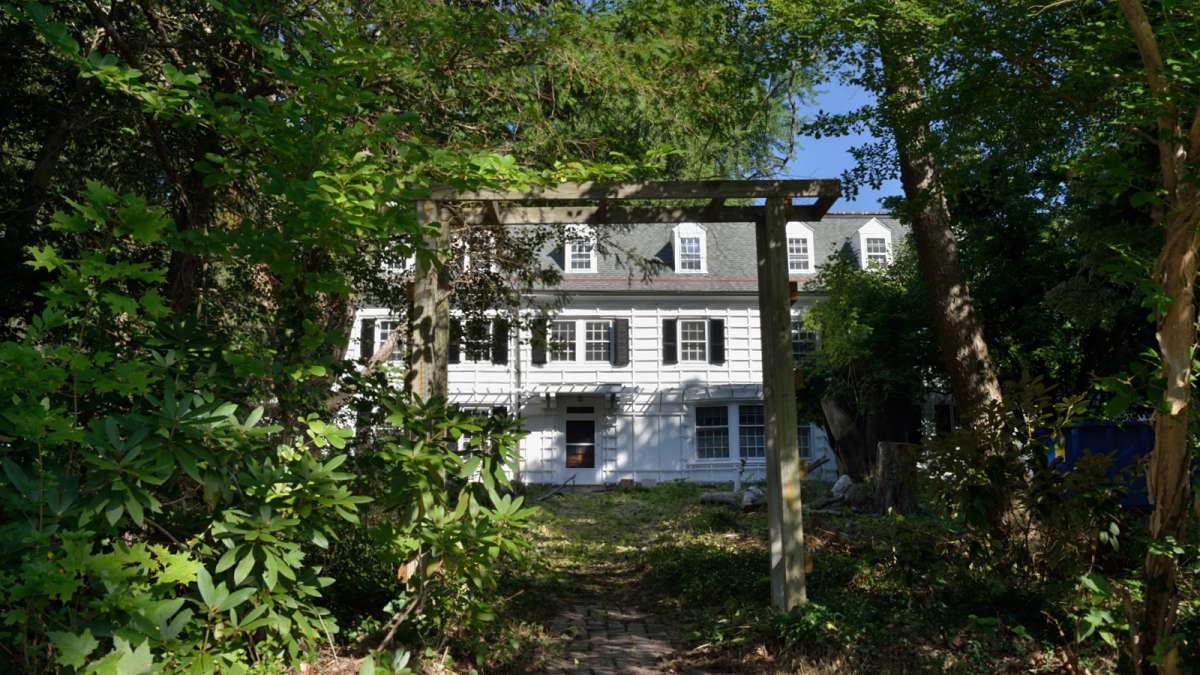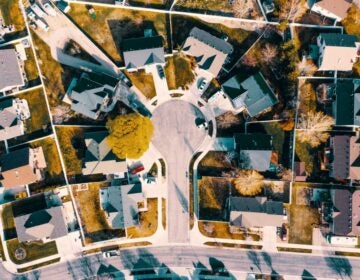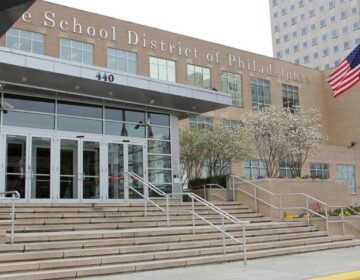‘Beyond repair’ home at heart of historic-preservation battle in Chestnut Hill
-

-

A 104-year-old house on West Moreland Avenue in Chestnut Hill is at the center of a preservation debate. (Bas Slabbers/for NewsWorks)
-

-

-

-

-

-

-

The proposed demolition of a historically significant house and the subdivision of the lot for the construction of two new homes would set a dangerous precedent for Chestnut Hill, according to community leaders.
The house at the center of the preservation debate is on West Moreland Avenue, a street lined with impressive mansions and well-kept properties. The 104-year-old house at 415 W. Moreland Ave. is among those cited in the Historic District’s inventory.
However, the Colonial Revival home is in obvious disrepair. Sections of stucco are detached. Gutters are broken and dangling. The site is overgrown and littered with fallen branches. And, a dumpster sits in the front yard.
“It’s not just about this house,” said Jennnifer Hawk, executive director of the Chestnut Hill Historical Society.
“It is a significant part of the National Historic District” designated in 1985, Hawk continued. “This could be the beginning of punching holes within the historic district.”
The property’s history
The property was purchased in April by Sam Blake, of Blake Development Corp., who has performed caring restorations of old homes throughout the Philadelphia area.
The house at 415 W. Moreland, he said, can’t be rehabilitated. He has received a zoning permit to subdivide the lot, but has not yet received a demolition permit.
The Historical Society is working to find a way to preserve the house before that happens.
The original developer
Charles Bromley, the descendant of a lacemaking dynasty and president of the Quaker Hosiery Company, commissioned architect Charles Barton Keen in 1910 to design the house.
Keen, a native Philadelphian and University of Pennsylvania graduate, had a strong reputation in the region for suburban semi-detached dwellings and country houses in Germantown, Overbrook and on the Main Line.
In 1907, he designed the sprawling English-style country estate Greystone Hall in Chester County for inventor/manufacturer Philip Sharples.
Shortly after building the Bromley house, Keen also built a reputation for fine homes in North Carolina for textile magnates and tobacco kings.
His most renowned design was Reynolda, a 1,067-acre estate north of Winston-Salem commissioned by R.J. Reynolds. The country estate had its own power plant, blacksmith shop, farms, gardens, greenhouses, and the main house called the “bungalow,” based on the style Keen had honed on Philadelphia’s Main Line, but on a grander scale.
The magnificent Reynolda led to commissions for many other homes and country clubs for the elite of Winston-Salem, Greensboro, Charlotte, Concord and Durham.
Cost of preservation
Restoring Keen’s Colonial Revival design in Chestnut Hill, as well as upgrading its interior amenities to make it marketable, would be a challenge for the developer, Hawk acknowledged.
“That’s where it doesn’t come together as financially viable for the developer,” she said.
Blake reportedly paid $800,000 for the property in the spring, and “the costs that have gone into it to clean up the house aren’t inconsiderable,” she said.
The Historical Society has reached to out to Blake to assist in various ways, including finding a buyer for a restored single-family house.
“There is a potential buyer who would love to purchase the house and do renovations over time,” Hawk said. “Unfortunately, the developer hasn’t responded to our outreach efforts about that.”
Fear of a trend
The proposed demolition of the Moreland house is “really the first of this nature” in Chestnut Hill, Hawk said.
There are 2,000 contributing houses in the National Historic District, and many are on lots that could be subdivided.
“If a property becomes more valuable than the house itself, we’re in trouble,” Hawk said. “Any developer could approach a historic house sitting in the middle of a large lot and think, If the house went away, two or three more could go up here.’ That’s the threat to a historic district.”
Hawk cited Greenwich, Ct., as “the perfect example” of a town where many Colonial homes were torn down to make way for large, new houses.
Community allies
The Chestnut Hill Civic Association weighed in on the debate over the Moreland Avenue house earlier this month, voting overwhelmingly to support the Historical Society in its effort to save the original structure. But, the civic group has heard from both sides.
“There have been a number of people who have come forward supporting what Mr. Blake is doing,” said association president Will Detweiler. “He has a very fine reputation for remodeling houses around Chestnut Hill and, in that sense, the community is fortunate in having someone of his caliber tackling these problem properties.”
There are other historic properties that could also be targets for drastic redevelopment, and it’s “perfectly legal,” Detweiler said. Some people argue that a house standing alone is not significant.
“If I lived next door to [415 W. Moreland}, I might feel anything is better than what we have,” he explained. “But, the community has to look in broader terms than one property. The mission of the Community Association is to protect and enhance the overall character of the community.”
While the Historical Society focuses on preservation, his organization looks at the “overall ambiance of the community and the people in it,” and tries to acts as peacemaker, Detweiler said.
Seeking compromise
The two groups contacted Blake, and “he nicely responded by taking a group to tour the property,” Detweiler said. “Everybody came away enthusiastic that something could be worked out.”
After the tour, Hawk found the house and property needed a lot of love, but were in “sound condition.”
Blake has said the house is “beyond repair.”
“It boils down to how can we work with him and at the same time represent the best interests of the community to achieve a win-win situation,” Detweiler said. “I like to see a bigger picture and how we can work out differences among friends.
“Chestnut Hill is a special place, and I think it’s special to Mr. Blake. That’s the common denominator: a love for the community. You have to bend a little bit. Life is full of compromises. I’d like to see the Civic Association function in that role.”
NewsWorks has partnered with independent news gatherer PlanPhilly to provide regular, in-depth, timely coverage of planning, zoning and development news. Contact Alan Jaffe at ajaffe@planphilly.com.
WHYY is your source for fact-based, in-depth journalism and information. As a nonprofit organization, we rely on financial support from readers like you. Please give today.
‘Beyond repair’ home at heart of historic-preservation battle in Chestnut Hill

The proposed demolition of a historically significant house and the subdivision of the lot for the construction of two new homes would set a dangerous precedent for Chestnut Hill, according to community leaders.
The house at the center of the preservation debate is on West Moreland Avenue, a street lined with impressive mansions and well-kept properties. The 104-year-old house at 415 W. Moreland Ave. is among those cited in the Historic District’s inventory.
However, the Colonial Revival home is in obvious disrepair. Sections of stucco are detached. Gutters are broken and dangling. The site is overgrown and littered with fallen branches. And, a dumpster sits in the front yard.
“It’s not just about this house,” said Jennnifer Hawk, executive director of the Chestnut Hill Historical Society.
“It is a significant part of the National Historic District” designated in 1985, Hawk continued. “This could be the beginning of punching holes within the historic district.”
The property’s history
The property was purchased in April by Sam Blake, of Blake Development Corp., who has performed caring restorations of old homes throughout the Philadelphia area.
The house at 415 W. Moreland, he said, can’t be rehabilitated. He has received a zoning permit to subdivide the lot, but has not yet received a demolition permit.
The Historical Society is working to find a way to preserve the house before that happens.
The original developer
Charles Bromley, the descendant of a lacemaking dynasty and president of the Quaker Hosiery Company, commissioned architect Charles Barton Keen in 1910 to design the house.
Keen, a native Philadelphian and University of Pennsylvania graduate, had a strong reputation in the region for suburban semi-detached dwellings and country houses in Germantown, Overbrook and on the Main Line.
In 1907, he designed the sprawling English-style country estate Greystone Hall in Chester County for inventor/manufacturer Philip Sharples.
Shortly after building the Bromley house, Keen also built a reputation for fine homes in North Carolina for textile magnates and tobacco kings.
His most renowned design was Reynolda, a 1,067-acre estate north of Winston-Salem commissioned by R.J. Reynolds. The country estate had its own power plant, blacksmith shop, farms, gardens, greenhouses, and the main house called the “bungalow,” based on the style Keen had honed on Philadelphia’s Main Line, but on a grander scale.
The magnificent Reynolda led to commissions for many other homes and country clubs for the elite of Winston-Salem, Greensboro, Charlotte, Concord and Durham.
Cost of preservation
Restoring Keen’s Colonial Revival design in Chestnut Hill, as well as upgrading its interior amenities to make it marketable, would be a challenge for the developer, Hawk acknowledged.
“That’s where it doesn’t come together as financially viable for the developer,” she said.
Blake reportedly paid $800,000 for the property in the spring, and “the costs that have gone into it to clean up the house aren’t inconsiderable,” she said.
The Historical Society has reached to out to Blake to assist in various ways, including finding a buyer for a restored single-family house.
“There is a potential buyer who would love to purchase the house and do renovations over time,” Hawk said. “Unfortunately, the developer hasn’t responded to our outreach efforts about that.”
Fear of a trend
The proposed demolition of the Moreland house is “really the first of this nature” in Chestnut Hill, Hawk said.
There are 2,000 contributing houses in the National Historic District, and many are on lots that could be subdivided.
“If a property becomes more valuable than the house itself, we’re in trouble,” Hawk said. “Any developer could approach a historic house sitting in the middle of a large lot and think, If the house went away, two or three more could go up here.’ That’s the threat to a historic district.”
Hawk cited Greenwich, Ct., as “the perfect example” of a town where many Colonial homes were torn down to make way for large, new houses.
Community allies
The Chestnut Hill Civic Association weighed in on the debate over the Moreland Avenue house earlier this month, voting overwhelmingly to support the Historical Society in its effort to save the original structure. But, the civic group has heard from both sides.
“There have been a number of people who have come forward supporting what Mr. Blake is doing,” said association president Will Detweiler. “He has a very fine reputation for remodeling houses around Chestnut Hill and, in that sense, the community is fortunate in having someone of his caliber tackling these problem properties.”
There are other historic properties that could also be targets for drastic redevelopment, and it’s “perfectly legal,” Detweiler said. Some people argue that a house standing alone is not significant.
“If I lived next door to [415 W. Moreland}, I might feel anything is better than what we have,” he explained. “But, the community has to look in broader terms than one property. The mission of the Community Association is to protect and enhance the overall character of the community.”
While the Historical Society focuses on preservation, his organization looks at the “overall ambiance of the community and the people in it,” and tries to acts as peacemaker, Detweiler said.
Seeking compromise
The two groups contacted Blake, and “he nicely responded by taking a group to tour the property,” Detweiler said. “Everybody came away enthusiastic that something could be worked out.”
After the tour, Hawk found the house and property needed a lot of love, but were in “sound condition.”
Blake has said the house is “beyond repair.”
“It boils down to how can we work with him and at the same time represent the best interests of the community to achieve a win-win situation,” Detweiler said. “I like to see a bigger picture and how we can work out differences among friends.
“Chestnut Hill is a special place, and I think it’s special to Mr. Blake. That’s the common denominator: a love for the community. You have to bend a little bit. Life is full of compromises. I’d like to see the Civic Association function in that role.”
NewsWorks has partnered with independent news gatherer PlanPhilly to provide regular, in-depth, timely coverage of planning, zoning and development news. Contact Alan Jaffe at ajaffe@planphilly.com.
WHYY is your source for fact-based, in-depth journalism and information. As a nonprofit organization, we rely on financial support from readers like you. Please give today.





